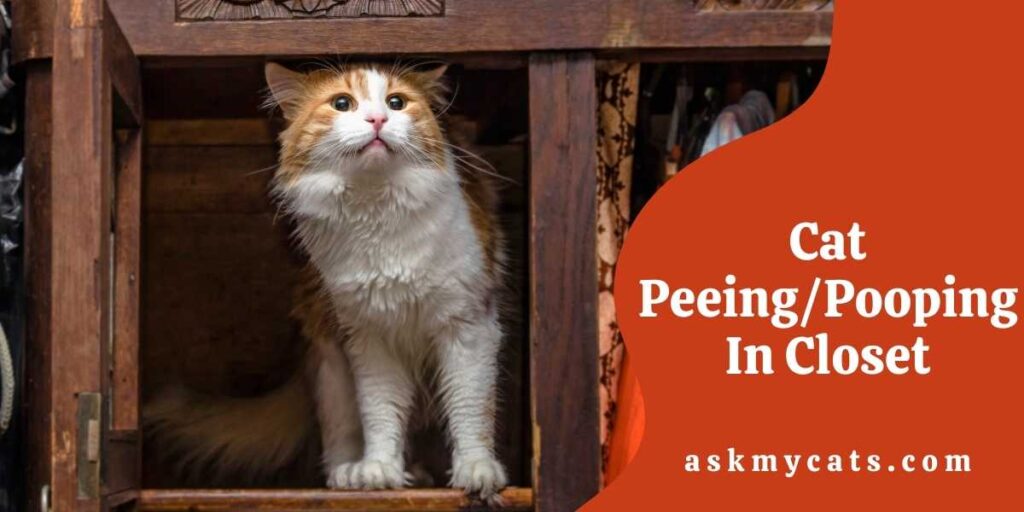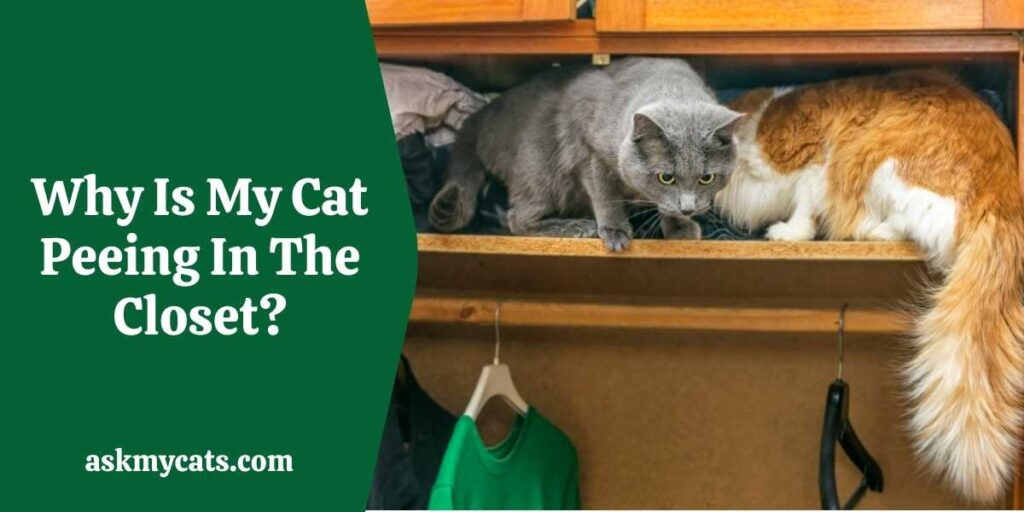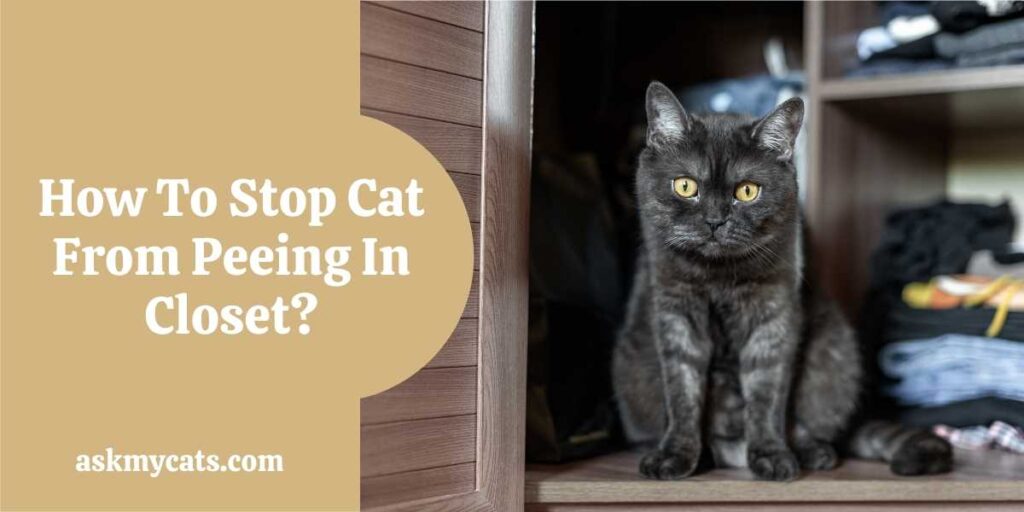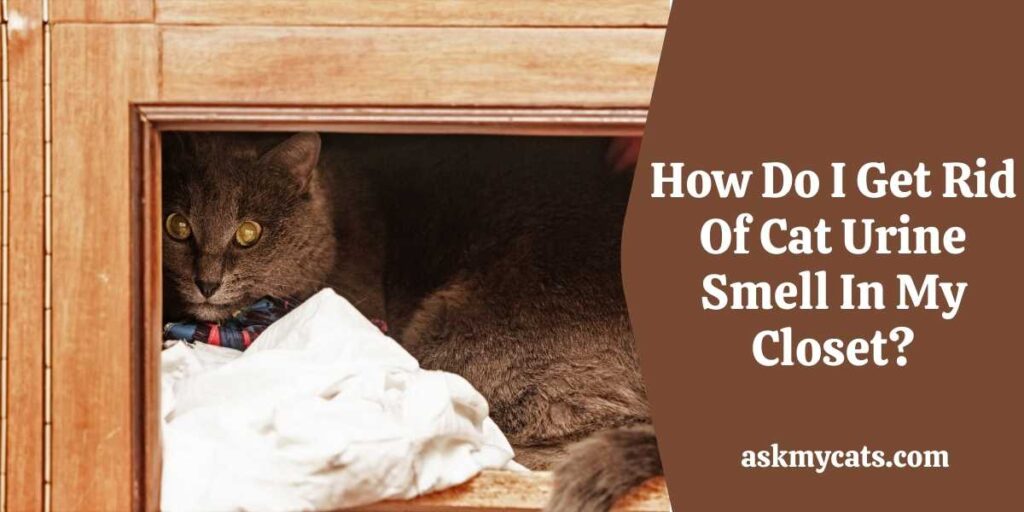There might be various reasons why your cat is urinating or pooping in the closet. It’s occasionally a behavioral issue, but it’s also possible that your cat is going beyond its box due to a medical ailment.
A urinary tract infection, for example, might evolve into a potentially life-threatening disease for your cat if left untreated.
A cat can start peeing or pooping inside the closet because he faces some issues with the litterbox, like a smelly litterbox, the wrong location of the box, etc. Then, he finds the closet is a dark and peaceful area to pee or poop.
Let’s look into some more details about this behavior.


Give Your Cat the Perfect Day
Get the Free Ebook!
Why Is My Cat Peeing In The Closet?
Your cat is peeing in the closet because he suffers from inappropriate elimination.

FIE, or Feline Inappropriate Elimination, is the most prevalent reason cats are ejected from their homes. Most owners don’t like it when their cat stops using the litter box to pee and defecate and instead selects other house areas to do so.
However, in 90% of cases or more, we can typically encourage your cat to use the litter box again using a combination of husbandry adjustments and medications.
Peeing in the closet is by far the most prevalent and least tolerated in FIE. Urine soaks into the carpet and wood beneath it, stinks, and is quite hard to clean and eliminate. As a result, owners soon lose tolerance when cats begin peeing outside of the litter box.
The first step is to determine whether the issue is medical or behavioral. This may be accomplished by taking your cat to the veterinarian for a urine test and an examination. If the urine is expected, the FIE is almost certainly behavioral.
However, just because you believe the urine is behavioral does not indicate it is.
Interstitial cystitis is a stress-related disease in cats. Because this illness may cause significant pain in urination, even if you think your cat is peeing outside the litter box out of habit, they could be in pain, which is why we always want to inspect your cat and their urine first.
There are a variety of medical concerns that might cause your cat to stop using the litter box, including diabetes, renal illness, hyperthyroidism, hypertension, arthritis, and dementia, which is why we will want to inspect your cat and potentially do a few tests to rule these diseases in or out.
Also, check out why is my cat pooping under my bed
How To Stop Cat From Peeing In Closet?
You have to thoroughly clean your cat’s litterbox to stop peeing in the closet.

First and foremost, scoop clumps from the litter box daily and thoroughly clean them regularly.
This entails discarding the old litter, washing the empty box with mild dish detergent and warm water, rinsing it with clean water, allowing it to air dry, and replacing it with a new, unscented supply of litter (sometimes scented litter is unappealing to finicky cats).
Use rubber gloves and a face mask to protect yourself from minute bugs and litter dust whenever you touch your cat’s litter box.
Suppose your cat seems to be drawn to a particular place, such as a bath mat, attempt to keep it out of the room by using a baby gate or closing/locking the door.
Simultaneously, encourage your pet to use its litter box properly by placing it far away from its food and drink bowls in a quiet, private spot that’s simple to access.
If you’ve acquired a second cat, rather than trying to make both cats share a litter box, consider adding multiple litter boxes. One litter box for each cat plus one extra is the ideal amount of litter boxes.
If you have two cats, this implies you should have three litter boxes. It’s worth noting that the boxes must be in entirely distinct locations. Otherwise, one cat may try to “protect” and “own” all toilets, preventing the other cat from using them.
Also, check out Why Is My Cat Hiding In The Closet?
How Do I Get Rid Of Cat Urine Smell In My Closet?
You have to sprinkle baking soda on the area to neutralize cat odors.

Baking soda is excellent for getting rid of smells. After absorbing most of the cat urine, sprinkle some baking soda on the carpet or other surfaces to help eradicate the odor in the long run. Allow at least half an hour for it to sit before vacuuming it up.
Before applying any solutions, soak up the cat urine as quickly as possible after the accident using an old cloth or paper towels. This will aid in absorbing the liquid, ensuring that there isn’t much left on the carpet or surface. The less urine there is, the less extensive cleaning is required.
If you find cat urine on your clothes, linens, or draperies, wash or dry clean them as quickly as possible.
Use an enzymatic cleaner or a cat urine remover to eliminate the stain and odor. This will “eat” the pee, removing any traces of odor. This is important because once a cat has urinated on a particular spot, it will be lured back to it repeatedly.
Cats won’t detect the aroma, thanks to enzyme cleansers. According to the manufacturer’s directions, allow the cleanser to dry or eliminate any remaining foam. Consider hiring a professional cleaner to eliminate any lingering scents.
Also, check out reasons and solution for cat peeing on bath mat
Why Do Cats Poop In The Closets?
Cats pooping in the closets can signify a medical or behavioral problem.
It’s critical to have your cat’s health assessed before assuming the incorrect elimination is a behavioral issue.
Your doctor will question you about your cat’s behavior and whether there are any additional symptoms, such as vomiting, diarrhea, a change in appetite, or lethargy, during the check-up. The veterinarian will thoroughly examine your cat for any symptoms of illness.
Additionally, lab tests and radiographs (X-rays) may be recommended.
Constipation, for example, might lead a cat to defecate on a rug or in another wrong location. Your backed-up cat, for example, may suddenly feel the need to relieve himself, but he may not be able to reach the litter box in time.
Inappropriate defecation might also be caused by pain or discomfort. Perhaps your cat has problems going in and out of the litter box and defecates when he can no longer contain it.
Perhaps the most comfortable position for the cat is one that can be achieved on the living room rug. Your veterinarian may detect a problem such as arthritis and prescribe therapy to help your cat feel better.
It’s essential to keep in mind that senior cats might acquire dementia. This can impact your cat’s behavior and even lead him to “forget” years of training. In this case, your veterinarian may be able to offer drugs or vitamins to help.
How Do I Get My Cat To Stop Pooping In The Closet?
Begin by carefully cleaning the places where your cat has pooped. If you don’t clean the area thoroughly enough, your cat will continue to be drawn to it.
Any goods that can be washed in the machine should be washed. If your cat has pooped on a bathmat or a cheap rug, you may need to discard it. Use a high-quality enzymatic cleaner for pet messes for the best results.
Cats prefer large, open litter boxes because they want to keep them as clean as possible.
Switch to large litter boxes that don’t have coverings. You could even create a king-sized improvised litter box out of a vast plastic under-the-bed storage box.
Add a second litter box in a different spot if you only have one. Place the second box near the area where your cat has been pooping in an unsanitary manner. If you have more than one cat, you may need to purchase additional litter boxes.
According to a decent general rule of thumb, there should be one more litter box in the house than there are cats. Every floor of the house should also have a litter box.
If you’re currently using scented litter, switch to unscented as soon as possible. While some people like scented litter to mask smells, many cats find artificial aromas overbearing and unappealing.
Frequently Asked Questions
Why is my cat pooping in my dirty clothes?
From his actions, it appears that he is suffering from either a physical (inflamed anal glands, maybe, or constipation) or an emotional problem. I’d say he’s acquired a liking for texture if it was only on the soft stuff.
Does vinegar stop cats from pooping?
Yes, vinegar works as a deterrent to keep cats from urinating and pooping in specific regions. Cats dislike the pungent odor of vinegar and avoid locations where it is present. Vinegar is an excellent deterrent since it is non-toxic, safe, and effective.
Why is my cat pooping on blankets?
Constipation, for example, might lead a cat to defecate on a rug or in another wrong location. Your backed-up cat, for example, may suddenly feel the need to relieve himself, but he may not be able to reach the litter box in time. Inappropriate defecation might also be caused by pain or discomfort.
Final Words
Closets of all the locations in a house appear to be the most common targets for improper eviction. Cats are drawn to this location for some reason. Maybe it’s the smell, or it’s the fact that closets are simple to knead and paw at like litter.
Ask your questions in the comments section below.
